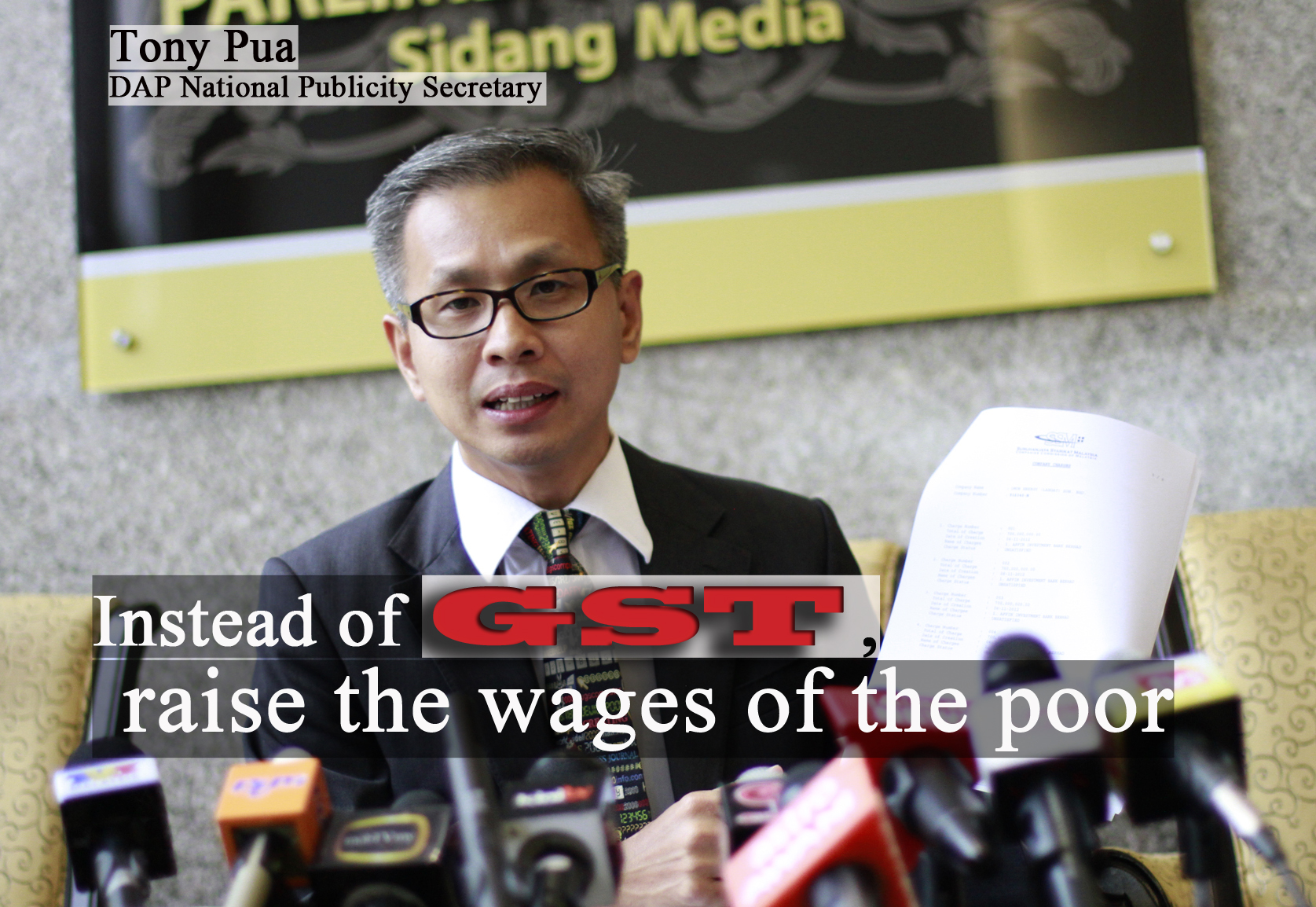 The cumbersome and complicated implementation of the goods and services tax (GST) should be put on hold until the income disparity between the rich and poor is significantly reduced.
The cumbersome and complicated implementation of the goods and services tax (GST) should be put on hold until the income disparity between the rich and poor is significantly reduced.
Following the much anticipated Budget speech on Friday, Petaling Jaya Utara MP Tony Pua has urged the government to hold the implementation of the tax, and focus on increasing wages of the 80 percent of Malaysians who do not fall within the income tax bracket.
He said that carrying out the tax come April next year would also be confusing, complicated and cumbersome seeing the long list of goods exempted from the tax.
Businesses will struggle to adjust their prices and operations effectively due to the complexities of pricing post-GST, taking into account the discrepancies between the exempted items, Pua claims. For instance, coffee powder is in the list of GST exempt items, but coffee beans are not specifically mentioned.
The items excluded from GST include all types of fruits, white and wholemeal bread; tea dust, coffee and cocoa powder; yellow mee, kuey teow, laksa and meehoon; essential medicine covering nearly 2,900 brands; all reading materials, including colouring and exercise books as well as newspapers.
Malaysians were also relieved to know that RON 95 petrol would be GST exempt.
“By creating a lengthy list of exemptions, the GST becomes a confusing, cumbersome and complicated tax for all stakeholders – the tax-paying consumers, the tax-operating businesses as well as the tax-collecting customs department,” said Tony Pua.
Tony Pua added that though he understands that the GST is more effective than the existing Sales and Services Tax (SST), the GST needs to have its exemption list kept to an absolute minimum.
He said the extensive list of exemptions would be difficult to implement. Tax experts have estimated that the majority of Malaysian companies have yet to prepare for GST as many do not possess the budget or know-how to make the necessary adjustments.
GST implementation would require a change in accounting software, invoice formats, employee training, cash flow, etc. All sectors including manufacturing, retail, services and small and medium industries would be affected by this move.
Hassle to implement GST-exemptions
The Petaling Jaya Utara MP also highlighted the hassle traders and tax authorities would go through trying to identify GST and exempt items.
With a mixture of sales of zero-rated, exempt, and taxable supplies, traders separate their accounts for each of these categories of sales. This would impose on them a significant additional burden of compliance.
“Some businesses can also easily be tempted to evade taxes on their taxable supplies, but even if not attempting to evade, can innocently make errors on their now complicated returns which need investigating and correcting, thereby adding to administration cost.” Tony opined.
As a result, tax authorities would have disputes with businesses over the technicality of taxable items or tax exempt goods. For instance, wholemeal bread is tax exempt, would it still be taxable were it packaged with chocolate chips?
He said that the criticisms against a GST system with a long list of exemptions has to do with the resulting high cost of doing business, extensive litigation and the heavy work load on tax authorities to enforce compliance.
“Under such circumstances, it is clear that it would be more sensible for the Government to postpone the implementation of the GST until such a time where its implementation would not require the Government to provide such an extensive list of exemptions,” said Tony Pua.
He asked the government to focus on increasing the income of the bottom 80 percent of Malaysians workers who do not qualify to pay income taxes.
If the income inequality is significantly reduced, GST could be implemented as a replacement tax regime without most of the tax exempt items as provided in this years budget, said Tony Pua. -The Rocket



